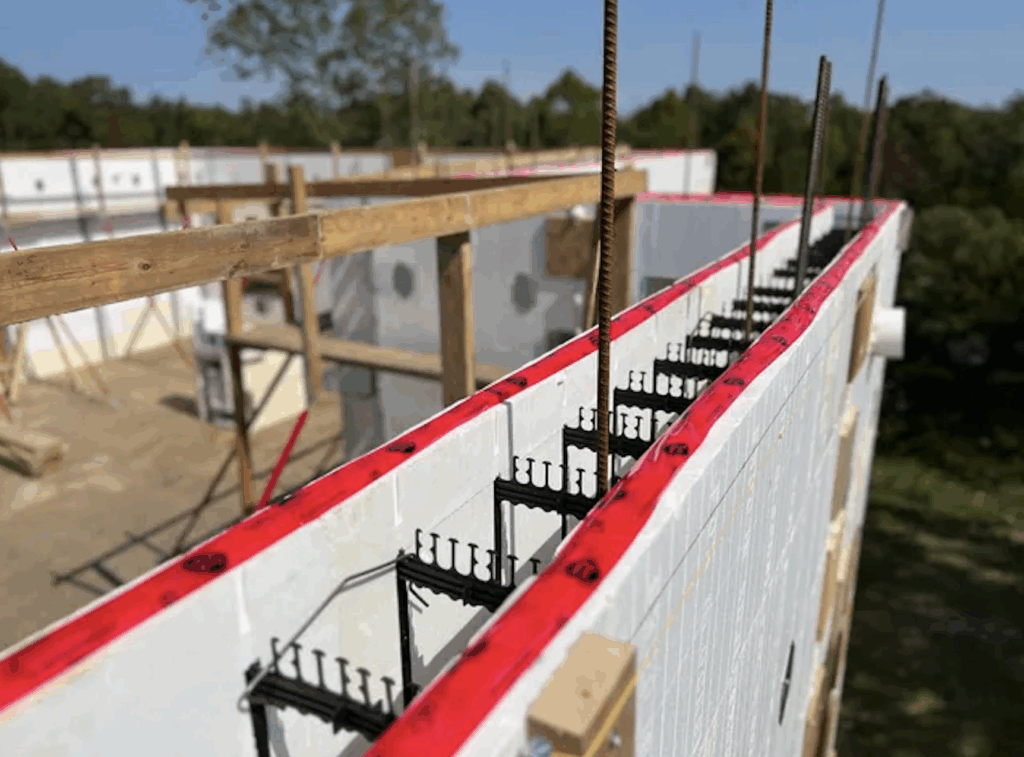Living in a quiet home isn’t just about comfort—it’s about health, productivity, and quality of life. Whether it’s the hum of traffic, neighbors walking above, or the sounds of a busy street, unwanted noise can disrupt daily life and even affect sleep, concentration, and stress levels. For homeowners and builders, selecting construction methods that naturally reduce sound transmission is increasingly important. This is where Insulated Concrete Form (ICF) walls come into play, offering a combination of energy efficiency, durability, and superior noise reduction.
At Batten Builders, we specialize in ICF construction and have witnessed firsthand how these walls transform the acoustic environment of a home. But what does the data say? How do ICF walls compare to traditional wood or steel framing when it comes to blocking sound? Let’s explore the science, statistics, and real-world implications of noise reduction in ICF construction.
Understanding Sound Transmission in Homes
Before diving into ICF performance, it’s essential to understand how sound moves through a building. Noise travels as vibrations through solid structures, a phenomenon known as structure-borne noise. In traditional wood-frame construction, thin walls with hollow cavities act as channels for sound waves, allowing noises from adjacent rooms or external sources to pass through relatively easily.
Sound is measured in decibels (dB), with a higher number indicating louder sound. In residential construction, even a 10-15 dB reduction can noticeably improve comfort. For example, normal conversation measures around 60 dB, and reducing ambient noise by 15 dB can make it seem almost half as loud to human ears.
Decibel Reduction: ICF vs. Traditional Walls
Studies and real-world tests consistently show that ICF walls outperform conventional framing in reducing sound transmission. The combination of reinforced concrete and insulating foam creates a dense, continuous barrier that both absorbs and blocks sound waves.
A typical 8-inch ICF wall has a Sound Transmission Class (STC) rating of 50-55, meaning it can reduce typical conversational noise by more than 50%. In comparison, a standard wood-frame wall with fiberglass insulation usually achieves an STC of 30-35. This difference is noticeable in everyday life. Where a traditional wall might allow conversations or TV sounds from neighboring rooms to carry, ICF walls make interior spaces significantly quieter.
Exterior noise control is another area where ICF walls shine. Homes near highways, airports, or busy neighborhoods benefit from ICF’s dense construction, which can reduce traffic and environmental noise by up to 40-50%, depending on wall thickness, finishes, and window quality. Residents report fewer disturbances from passing vehicles, lawn equipment, and other outside sounds.
Real-Life Case Studies
Several studies and projects provide real-world evidence of ICF noise reduction benefits. One study by the Portland Cement Association compared homes built with ICF walls to wood-frame homes in the same neighborhood. Researchers measured sound levels from nearby traffic and found that ICF homes consistently registered 10-20 dB lower inside living spaces, confirming that occupants experienced a quieter, more comfortable environment.
Another case study focused on multi-family buildings, where noise complaints are common. An apartment complex constructed with ICF walls saw a 70% reduction in tenant complaints related to noise compared to a similar building using traditional wood framing. Residents reported a dramatic improvement in privacy and overall satisfaction.
Why ICF Walls Are Superior for Acoustic Comfort
The reasons for ICF’s acoustic performance are rooted in its structure. ICF walls consist of two layers of reinforced concrete sandwiching a thick layer of insulating foam. This combination achieves three critical effects:
1. Mass: Concrete’s density naturally blocks sound waves. Heavier walls are more difficult for vibrations to penetrate, reducing noise transmission.
2. Insulation: The foam layer absorbs sound energy, preventing it from bouncing through the wall cavity like it would in hollow framing.
3. Continuity: Unlike stud walls, which have gaps, seams, and joints that allow sound to leak through, ICF walls are continuous, leaving fewer pathways for noise.
Together, these features create walls that are inherently quieter, providing peace of mind for homeowners in busy or densely populated areas.
Additional Benefits of Quieter Homes
While the acoustic benefits are significant, quieter homes offer more than just comfort. Research shows that reduced noise improves sleep quality, lowers stress hormones, and enhances productivity for those working from home. In family spaces, reduced background noise allows for better communication and less distraction. Combined with ICF’s energy efficiency, durability, and storm resistance, acoustic comfort becomes another compelling reason to choose this construction method.
How to Maximize Noise Reduction with ICF
To get the most acoustic benefit from ICF construction, consider the following strategies:
-
Wall Thickness: Thicker ICF walls provide higher STC ratings and better exterior noise reduction.
-
Sealing Gaps: Properly sealing joints, windows, and doors prevents sound leaks.
-
Complementary Materials: Using acoustic drywall, insulated windows, and floor underlayments enhances soundproofing.
-
Design Considerations: Positioning bedrooms and quiet spaces away from street-facing walls maximizes the benefits.
At Batten Builders, we integrate these strategies into every ICF project to ensure optimal comfort, functionality, and value for homeowners.
Conclusion: ICF Construction Is an Investment in Comfort
For Gulf Coast homeowners, multi-family developers, or anyone building in a noisy environment, ICF walls offer an unmatched combination of durability, energy efficiency, and acoustic performance. With decibel reductions of up to 20 dB over traditional wood framing, real-life case studies demonstrating reduced complaints, and built-in benefits like insulation and storm resistance, ICF construction isn’t just a structural choice—it’s an investment in quality of life.
Choosing ICF walls with Batten Builders means your home or building will not only withstand the elements but also provide a quiet, serene space for living, working, and relaxing. Whether it’s a waterfront property, a city-adjacent home, or a multi-family development, ICF construction delivers peace, comfort, and long-term value.





